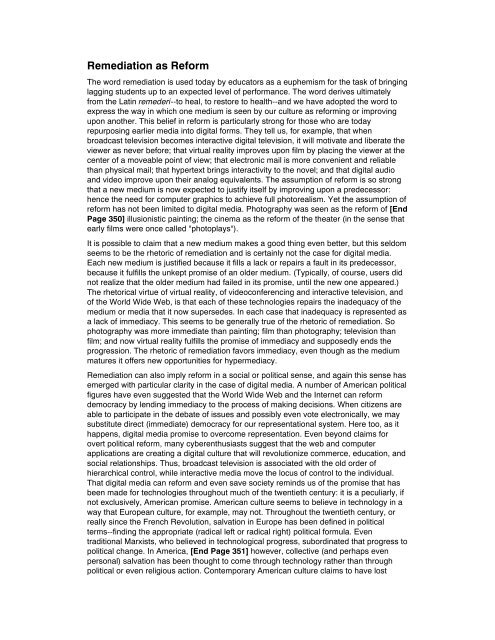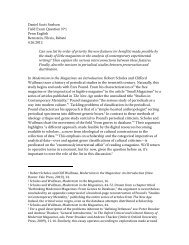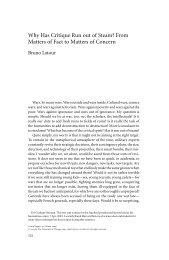Remediation - Dss-edit.com
Remediation - Dss-edit.com
Remediation - Dss-edit.com
You also want an ePaper? Increase the reach of your titles
YUMPU automatically turns print PDFs into web optimized ePapers that Google loves.
<strong>Remediation</strong> as Reform<br />
The word remediation is used today by educators as a euphemism for the task of bringing<br />
lagging students up to an expected level of performance. The word derives ultimately<br />
from the Latin remederi--to heal, to restore to health--and we have adopted the word to<br />
express the way in which one medium is seen by our culture as reforming or improving<br />
upon another. This belief in reform is particularly strong for those who are today<br />
repurposing earlier media into digital forms. They tell us, for example, that when<br />
broadcast television be<strong>com</strong>es interactive digital television, it will motivate and liberate the<br />
viewer as never before; that virtual reality improves upon film by placing the viewer at the<br />
center of a moveable point of view; that electronic mail is more convenient and reliable<br />
than physical mail; that hypertext brings interactivity to the novel; and that digital audio<br />
and video improve upon their analog equivalents. The assumption of reform is so strong<br />
that a new medium is now expected to justify itself by improving upon a predecessor:<br />
hence the need for <strong>com</strong>puter graphics to achieve full photorealism. Yet the assumption of<br />
reform has not been limited to digital media. Photography was seen as the reform of [End<br />
Page 350] illusionistic painting; the cinema as the reform of the theater (in the sense that<br />
early films were once called "photoplays").<br />
It is possible to claim that a new medium makes a good thing even better, but this seldom<br />
seems to be the rhetoric of remediation and is certainly not the case for digital media.<br />
Each new medium is justified because it fills a lack or repairs a fault in its predecessor,<br />
because it fulfills the unkept promise of an older medium. (Typically, of course, users did<br />
not realize that the older medium had failed in its promise, until the new one appeared.)<br />
The rhetorical virtue of virtual reality, of videoconferencing and interactive television, and<br />
of the World Wide Web, is that each of these technologies repairs the inadequacy of the<br />
medium or media that it now supersedes. In each case that inadequacy is represented as<br />
a lack of immediacy. This seems to be generally true of the rhetoric of remediation. So<br />
photography was more immediate than painting; film than photography; television than<br />
film; and now virtual reality fulfills the promise of immediacy and supposedly ends the<br />
progression. The rhetoric of remediation favors immediacy, even though as the medium<br />
matures it offers new opportunities for hypermediacy.<br />
<strong>Remediation</strong> can also imply reform in a social or political sense, and again this sense has<br />
emerged with particular clarity in the case of digital media. A number of American political<br />
figures have even suggested that the World Wide Web and the Internet can reform<br />
democracy by lending immediacy to the process of making decisions. When citizens are<br />
able to participate in the debate of issues and possibly even vote electronically, we may<br />
substitute direct (immediate) democracy for our representational system. Here too, as it<br />
happens, digital media promise to over<strong>com</strong>e representation. Even beyond claims for<br />
overt political reform, many cyberenthusiasts suggest that the web and <strong>com</strong>puter<br />
applications are creating a digital culture that will revolutionize <strong>com</strong>merce, education, and<br />
social relationships. Thus, broadcast television is associated with the old order of<br />
hierarchical control, while interactive media move the locus of control to the individual.<br />
That digital media can reform and even save society reminds us of the promise that has<br />
been made for technologies throughout much of the twentieth century: it is a peculiarly, if<br />
not exclusively, American promise. American culture seems to believe in technology in a<br />
way that European culture, for example, may not. Throughout the twentieth century, or<br />
really since the French Revolution, salvation in Europe has been defined in political<br />
terms--finding the appropriate (radical left or radical right) political formula. Even<br />
traditional Marxists, who believed in technological progress, subordinated that progress to<br />
political change. In America, [End Page 351] however, collective (and perhaps even<br />
personal) salvation has been thought to <strong>com</strong>e through technology rather than through<br />
political or even religious action. Contemporary American culture claims to have lost









